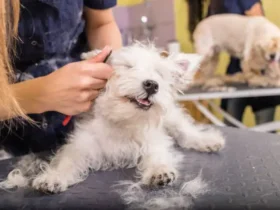How to Keep Your Dog’s Teeth Clean: Essential Tips for Healthy Canines
Keeping your dog’s teeth clean is vital for their overall health and well-being. Just like humans, dogs can suffer from dental problems such as plaque buildup, gum disease, and bad breath. However, with the right care and attention, you can prevent these issues and keep your dog’s teeth in top condition. This guide will provide you with detailed tips on how to maintain your dog’s oral hygiene effectively.
1. Understanding the Importance of Canine Dental Care
Oral health is crucial for dogs as it directly impacts their overall health. Dental diseases can lead to pain, tooth loss, and even systemic issues such as heart and kidney problems. Regular dental care helps prevent these issues, ensuring your dog lives a healthier, happier life.
2. Start Early: Puppy Dental Care
It’s essential to start dental care when your dog is still a puppy. Introducing dental hygiene practices early makes it easier for your dog to get used to the routine. Here are some tips for puppy dental care:
- Introduce Toothbrushing Gradually: Begin by letting your puppy get used to the taste of dog-friendly toothpaste. Then, gradually introduce the toothbrush.
- Use Puppy-Specific Products: Ensure you’re using toothpaste and toothbrushes designed specifically for puppies, as their teeth and gums are more sensitive.
3. Daily Toothbrushing Routine
Brushing your dog’s teeth daily is the most effective way to keep them clean. Here’s how to establish a successful brushing routine:
- Choose the Right Tools: Use a soft-bristled toothbrush and dog-friendly toothpaste. Never use human toothpaste, as it contains ingredients harmful to dogs.
- Proper Brushing Technique: Gently lift your dog’s lips to expose their teeth, and brush in small, circular motions. Focus on the gum line where plaque tends to accumulate.
- Reward and Praise: Positive reinforcement is key. Offer treats or praise after brushing to make the experience enjoyable for your dog.
4. Incorporate Dental Chews and Toys
Dental chews and toys are excellent supplements to brushing. They help remove plaque and tartar while keeping your dog entertained. Consider the following:
- Look for Veterinary Seal of Approval: Choose dental chews that have been approved by veterinary dental associations.
- Monitor Chewing Habits: Ensure that the chews are the right size for your dog to prevent choking hazards. Supervise your dog while they chew.
5. Healthy Diet for Oral Health
A balanced diet plays a significant role in maintaining your dog’s dental health. Certain foods can help keep their teeth clean:
- Dry Kibble Over Wet Food: Dry kibble can help scrape away plaque, while wet food may stick to teeth and promote plaque buildup.
- Add Dental-Approved Treats: Incorporate dental treats that are designed to promote oral health. These treats can help reduce plaque and freshen breath.
6. Regular Professional Dental Cleanings
Even with the best at-home care, your dog will benefit from regular professional cleanings:
- Schedule Regular Vet Visits: Your vet will examine your dog’s teeth during regular check-ups and recommend cleanings as needed.
- Anesthesia and Cleaning: Professional cleanings are performed under anesthesia to thoroughly clean below the gum line, where most dental problems begin.
- Follow Post-Cleaning Instructions: After a professional cleaning, follow your vet’s advice for post-care to maintain the cleanliness of your dog’s teeth.
7. Recognizing Signs of Dental Problems
Being aware of the signs of dental issues can help you catch problems early. Look out for:
- Bad Breath: Persistent bad breath can indicate a dental problem.
- Discolored Teeth or Gums: Yellow or brown teeth, or red and swollen gums, are signs of plaque buildup or gum disease.
- Difficulty Eating: If your dog is hesitant to eat or chew, it could be due to dental pain.
- Excessive Drooling or Pawing at Mouth: These behaviors may indicate discomfort or pain related to dental issues.
8. Use of Water Additives and Oral Sprays
Water additives and oral sprays can be useful for maintaining your dog’s oral health between brushings:
- Choose Vet-Approved Products: Ensure the additives or sprays you use are safe and recommended by veterinarians.
- Easy to Use: Simply add the water additive to your dog’s drinking water, or spray the oral solution directly onto their gums.
9. Avoiding Harmful Habits
Certain habits can damage your dog’s teeth and gums. Be mindful of the following:
- Avoid Hard Chews: Hard bones, antlers, and hooves can crack your dog’s teeth. Opt for safer chew options like rubber toys or specially designed dental chews.
- Discourage Chewing on Non-Edible Objects: Prevent your dog from chewing on sticks, stones, or other hard objects that can harm their teeth.
10. Establishing a Lifelong Oral Care Routine
Consistency is key to maintaining your dog’s oral health. Create a routine that you can stick to throughout your dog’s life:
- Set a Schedule: Brush your dog’s teeth at the same time each day to build a routine.
- Regular Check-Ups: Don’t skip regular vet visits, as they are crucial for monitoring your dog’s dental health.
- Stay Informed: Keep up with the latest recommendations for canine dental care to ensure you’re providing the best possible care.
Conclusion
Maintaining your dog’s dental health is an ongoing commitment, but it’s essential for their overall well-being. By following these tips and establishing a consistent dental care routine, you can help prevent dental diseases and keep your dog’s teeth and gums healthy. Remember, a healthy mouth contributes to a healthy dog, so start taking care of your dog’s teeth today!
This comprehensive guide should help you effectively manage your dog’s dental health, ensuring they remain happy and healthy for years to come.











Leave a Reply